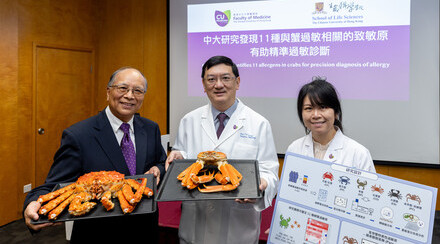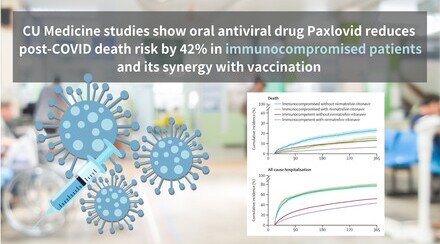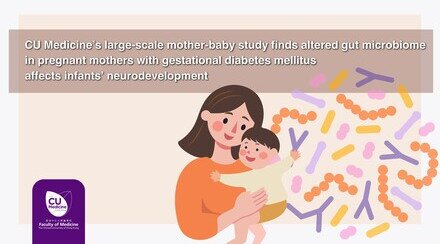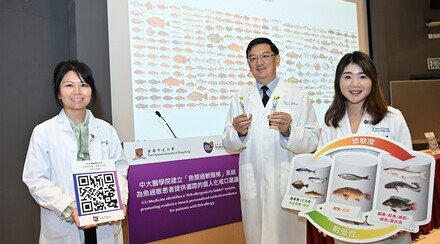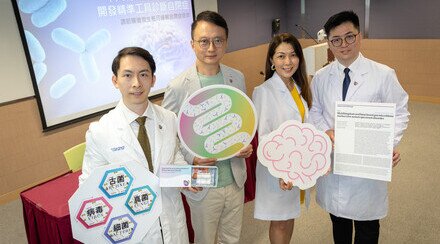CU Medicine Study Suggests Toddlers are at High Risk of Being “Silent Spreaders of SARS-CoV2 Infection”
The Faculty of Medicine at The Chinese University of Hong Kong (CU Medicine) has found that most toddlers infected with SARS-CoV2 virus do not have symptoms, but have a high viral load and a long duration of live viral shedding. Therefore, they may silently spread the infection in the community. Detection and prevention of SARS-CoV2 infection in children in Hong Kong should be properly addressed as face-to-face classes in schools will be gradually resumed after the Easter holidays. A stool test is an invasive and accurate method for diagnosis of infection. It is more feasible for young children compared with deep throat saliva method or combined nasal and throat swab. To cut off the hidden chain of virus transmission, CU Medicine suggests promoting the use of stool tests for community compulsory testing or daily COVID-19 testing of young children.

CU Medicine has found that over 40% of toddlers infected with SARS-CoV2 virus do not have symptoms, but have a high viral load and a long duration of live viral shedding. Therefore, they may silently spread the infection in the community. (From left) Professor Albert Martin LI, Chairman of the Department of Paediatrics; Professor Siew Chien NG, Associate Director of the Centre for Gut Microbiota Research; and Professor Paul Kay Sheung CHAN, Chairman of the Department of Microbiology at CU Medicine.
Proportion of COVID-19 paediatric cases in Hong Kong higher than mainland and countries in the US and Europe
As at 25 March 2021, there was a total of 11,429 confirmed COVID-19 cases in Hong Kong. Among them, 929 cases (8%) are aged 17 or below. Toddlers aged 3 or below accounted for 201 cases (22%) and over 40% of them (87 cases) were asymptomatic.
The research team from CU Medicine found that the proportion of COVID-19 paediatric cases in Hong Kong is higher than that of Mainland China, Italy, Spain and the US. An overseas study reported that children had a significantly higher viral load than adults admitted to intensive care. High viral loads mean they are more contagious.

Stool test proved to be a highly efficient testing tool for COVID-19 hidden cases
CU Medicine has been providing free stool tests for COVID-19 screening since late March last year. As at 25 March 2021, the CUHK Coronavirus (COVID-19) Testing Centre has completed 17,500 stool tests and successfully identified 22 COVID-19 confirmed cases with a positive rate of 0.13%.
Over 70% of the 22 confirmed cases were silent carriers without symptoms. Twenty of them were children aged 6 or below, contributing to over 90% of the total. Professor Paul Kay Sheung CHAN, Chairman of the Department of Microbiology at CU Medicine pointed out, “The stool test is accurate and safe, and effective for screening silent carriers who failed to provide respiratory samples. Our findings show that most toddlers are likely SARS-CoV2 silent spreaders. They are more contagious as they carry no symptoms but a high viral load, and 90% of these samples contain live viruses. Their incubation period of the virus is longer, and could have been up to 36 days in one of the cases. As they could easily be the source of transmission, allowing the virus to spread in the community, we should pay extra attention to this age group.”
Professor Albert Martin LI, Chairman of the Department of Paediatrics at CU Medicine said, “Fever, cough and rhinorrhoea are some very common symptoms found in paediatric COVID-19 infection, and in flu. We therefore remind parents to pay extra attention to their children’s health condition and that they should bring them to the doctor or go for a COVID-19 screening. This is especially important for those who feel sick after visiting high risk areas, or the residential building they live in has to undergo compulsory testing, or there is a reported sickness of unknown cause in school personnel and students.”

Professor Paul Kay Sheung CHAN

Professor Albert Martin LI






























